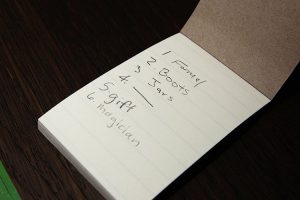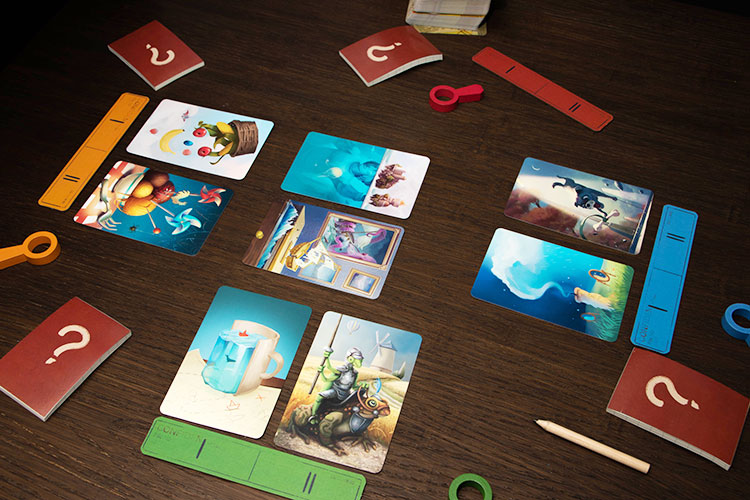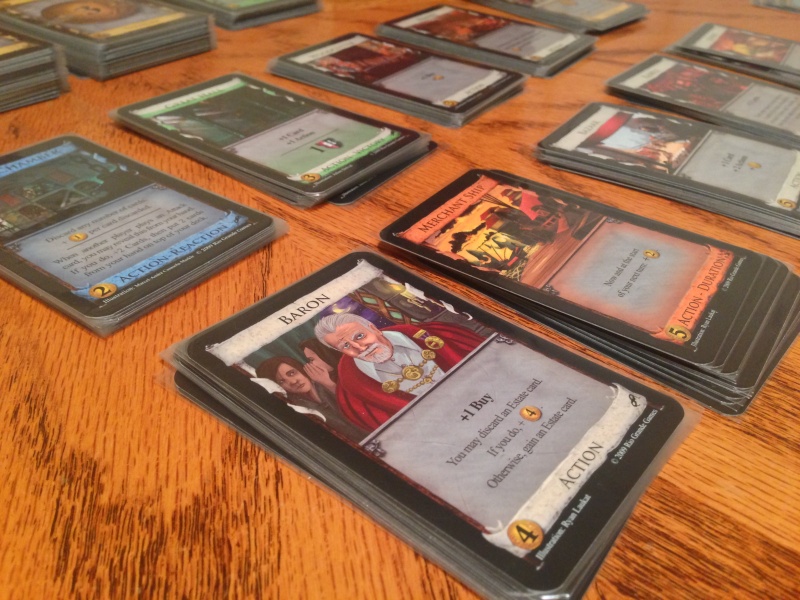 There are a handful of party games out there on the market that revolve around everyone, except one person, knowing something. And the game, generally, revolves around trying to deduce who the person without the information is. Fake Artist Goes to New York does this with a communal drawing of a picture. Spyfall uses a 20-Questions mechanism to suss out the spy. Today we are looking at Detective Club, which uses a similar setup but the clues are given with Dixit-style cards.
There are a handful of party games out there on the market that revolve around everyone, except one person, knowing something. And the game, generally, revolves around trying to deduce who the person without the information is. Fake Artist Goes to New York does this with a communal drawing of a picture. Spyfall uses a 20-Questions mechanism to suss out the spy. Today we are looking at Detective Club, which uses a similar setup but the clues are given with Dixit-style cards.
Gameplay Overview:
In Detective Club, all players will begin the game with six cards in their hand. These cards are reminiscent of the cards from Dixit or Mysterium—covered in beautiful, but someone nonsensical artwork. Each turn, one player will come up with a single word that they think they can convey with two of the cards in their hand. They will write that word in a notebook for each player. Except for one player’s notebook, who won’t have the word at all.
Then the active player will play one of their cards to the center of the table that they believe relates to their chosen word. Every player will go around the table doing the same. Everyone plays a second card and then the active player will announce out loud what the word was. Of course, that is old news to almost everyone.

Players will then talk about how the cards they chose relate to the word. If you didn’t know the word to begin with, you’ll have to think on your feet and try to justify it somehow. It’s certainly possible you did know the word and, because you are limited to the six cards in your hand, just didn’t have anything plainly obvious to use so the descriptions can get pretty creative.
Once everyone has had a chance to give their explanation, players will vote on who they believe the conspirator—the player who never saw the word—is. Then the conspirator reveals themselves and everyone who voted for that person scores three points. If the conspirator had no votes or only a single vote, they score five points and the active player scores four.
The game is played until everyone has had a chance to be the active player the same number of times (the game suggests twice each if playing with less than 6 players) and whoever has the most points wins.

Game Experience:
The fun of Detective Club comes from the explanation step of the round. It’s where you, as a person who knew the word but had terrible cards to go with it, have to really sell your friends on why you played their card with a hot air balloon on it when the word was “boat”. (Obviously, the answer was the balloon is someone like a parachute and you can parasail behind a boat.)

Or, maybe you didn’t know the word at all, but as a wily conspirator, you just tried to play cards that were somewhat like the ones played by the active player. Others may call that out as the reason you should be voted for, but it’s really the best chance you have at making it out without getting all the votes.
Once the voting happens, the scoring isn’t really that important. If you are the type of player who likes to play the games to win them, Detective Club is probably not for you. It serves as a fun experience but scoring points (and playing the suggested number of rounds) isn’t really what most people involved are going to want to do.
That said, for this genre of game, I found the limiting factor of the cards to be more frustrating than interesting. Fake Artist and Spyfall thrive on your ability to be creative and think outside of the box somewhat. Here, however, you can’t really help it if your cards don’t relate to the clue. You kind of turn into a salesperson. If you are a person who doesn’t like being the spy in Spyfall though, this might sit better with you. All you have to do is pick a card and play it. All of the defending it comes after you know the information. It can still be stressful, but the “I didn’t have any cards that really matched the word,” defense will go a long way. But the fact that it is often just as true whether you know the word or not takes a little of the bite out of the game for me.

Final Thoughts:
When it comes to games where one player doesn’t know something, Detective Club feels a bit different. In many other games, you can ask, or draw, anything in the world. So not knowing the information makes it pretty difficult to hide that fact. But with Detective Club you have to play two of your six cards, so potentially you aren’t going to be able to make it obvious you do, or don’t, know the information.
Ultimately, Detective Club is a fun experience. While comparing it to other games may not be entirely fair, I think there is probably only room for so many similar games in any person’s collection. It just feels a bit more relaxed. If you don’t like the stress of being put on the spot, that can certainly be a good thing. The discussion about why you chose the cards can be hilarious and is really where Detective Club shines.
Final Score: 3 Stars — A fun game to play now and then but not my favorite of similar games.
 Hits:
Hits:
• Explaining why you chose your cards can be lots of fun.
• Accommodates up to 8 players for a big party night.
Misses:
• Limited number of cards can limit your decisions.
• Scoring is mostly superfluous.























